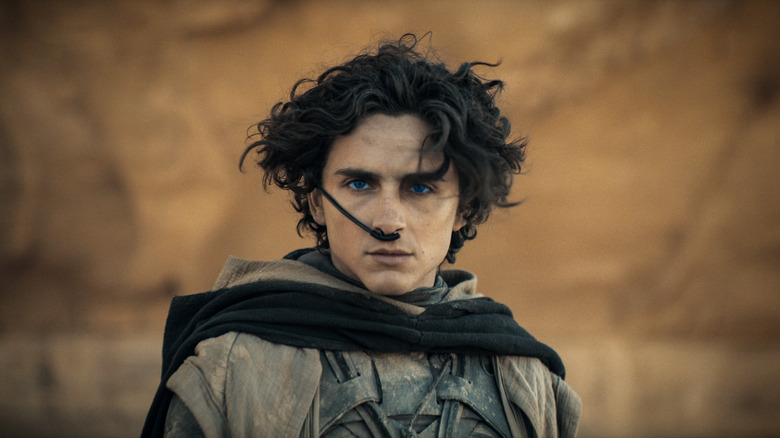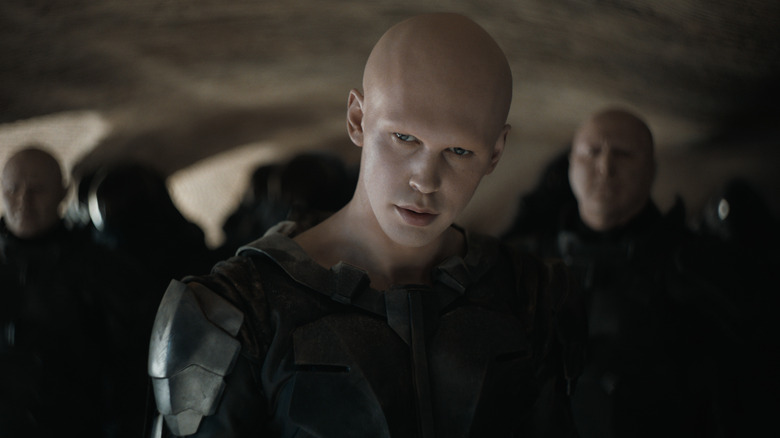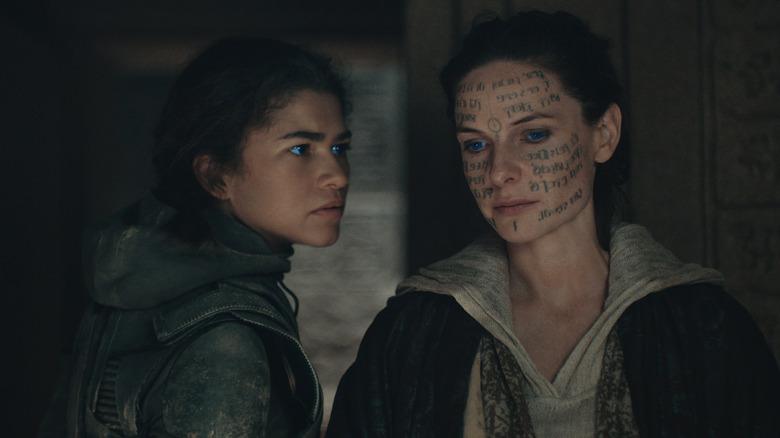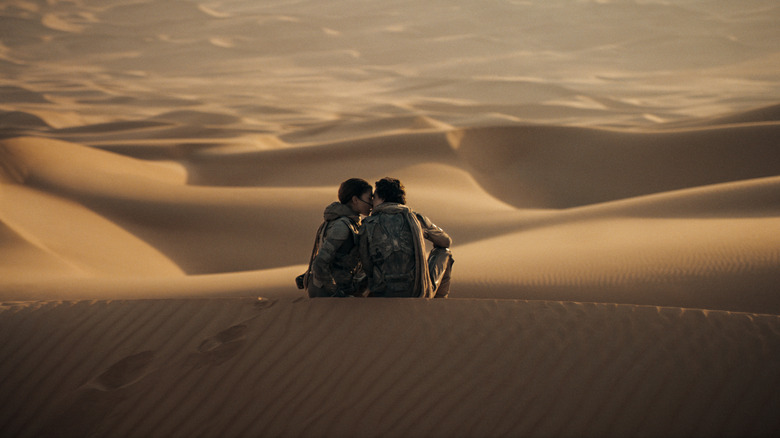Dune: Part Two Review: A Bleak Blockbuster About Religion, Revenge, And Really Big Worms
"Dune: Part Two" is a rare big, expensive blockbuster with a lot on its mind. Not content with just spectacle (and boy, there is a lot of that), Denis Villeneuve's sequel packs in heavy thoughts on religion, war, revenge, romance, and yes, really big worms. It's not entirely successful, but gosh, you gotta appreciate the attempt. I thought Villeneuve's first "Dune," adapted from the tome by Frank Herbert, was pretty good, but it also felt like standard sci-fi stuff. Not so with the sequel, which is one of the bleakest blockbusters ever made. This is not the whiz-bang entertainment of "Star Wars," it's something far more serious. Perhaps too serious — don't be surprised if you come out of this movie feeling rather morose.
At the center of "Dune: Part Two" is a story of faith — faith both pure and manipulated. This is a saga of a messiah in the making; a very human man thrust into the role of the divine. And what would happen if that newfound savior used his recently bestowed holy gifts to launch a plot for revenge? Would the faithful see through the plan, or would they fall in line and follow their new prophet into oblivion? Not an easy question to ask, and yet "Dune: Part Two" wants to ask it — in between scenes of brain-rattling explosions and giant sandworms wrecking stuff, that is.
Christopher Walken: Dune MVP
When we last saw Paul Atreides (Timothée Chalamet), his entire life as he knew it had been obliterated. His father, a Duke assigned to oversee the spice mines on the desert planet Arrakis, was betrayed and killed by the evil Harkonnen family. Almost all of the Atreides' soldiers and subjects were slaughtered while Paul and his mother Jessica (Rebecca Ferguson) escaped into the desert. Paul and Jessica were eventually taken in by the Fremen, the native people of Arrakis. And then the movie ended! It was a lot of setup with no real payoff.
"Dune: Part Two" picks up almost immediately where the first film concluded. Paul, who understandably wants revenge, and Jessica have gone deeper into the Fremen territory, while the Harkonnen, lead by the massive, frequently floating Baron Vladimir Harkonnen (Stellan Skarsgård), try to take over Arrakis. Lurking in the background is the treacherous Emperor of the Universe, played by Christopher Walken, and his distraught daughter, Princess Irulan (Florence Pugh). Neither Walken nor Pugh has a whole lot to do here, but it's a treat to watch Walken work — he shows up, delivers his ominous lines with a whisper, and wipes the floor with anyone he's acting against. Show 'em how it's done, Christopher Walken.
There's also a new villain on the scene: the psychotic Feyd-Rautha, nephew of the Baron. Played by Austin Butler, who has dropped his Elvis voice to do a pretty good impersonation of Stellan Skarsgård, Feyd-Rautha is a violence-loving creep with dreams of power. Meanwhile, out in the desert, Paul is becoming something else. Taking on the Fremen name Muad'Dib, Paul leads bands of Fremen fighters against the Harkonnens. Why do the Fremen follow this outsider? Because they think he's the messiah.
Loaded material
This is loaded material. The Fremen are portrayed almost entirely by people of color, and the story has them bowing down to Timothée Chalamet, who is quite white. Villeneuve doesn't shy away from this element, and the film has several characters point out that the real Fremen messiah should be an actual Fremen, not some outsider. Ferguson's Jessica, meanwhile, recognizes these doubts and decides to exploit and manipulate things behind the scenes to get what she wants. But what of Paul?
For most of the runtime, Paul is a rather passive character; a reluctant savior going about his business. He's happy to become one of the Fremen, but he's shy about the whole "messiah" thing. His paramore Chani (Zendaya, who has a lot more screen time here than she did in the first film), loves Paul, but she also doesn't believe in the prophecies. This clashes with the Fremen Stilgar (Javier Bardem), who is all-in on Paul being divine.
Again: this is deep stuff, but "Dune: Part Two" only flirts with it for most of its length. As a result, the film begins to grow repetitive. It's never boring, and its hefty runtime moves at a brisk pace, but Paul's indecision and reluctance make the narrative stagnant. Eventually, Villeneuve rectifies this with a stunner of a third act; a big, loud, terrifying finale that caught me by surprise. I just wish the rest of the movie was as effective.
An incomplete story
That's not to say "Dune: Part Two" is a disappointment. It's a grand, overwhelming sensory experience. Villeneuve has a great grasp on scale, and everything here feels appropriately huge. A shot of those giant sandworms bursting forth through a sandstorm is genuinely frightening because we can sense how massive these things are. The costumes pop, the scenery stuns, and Hans Zimmer's score booms and drones until you can feel it rattling your ribcage. If nothing else, "Dune: Part Two" is a triumph of production design.
But the script, by Villeneuve and Jon Spaihts, is too aimless for a large chunk of time. It wanders around the desert, occasionally picking up signs of life here and there. This is a frequently awe-inspiring movie that also can't quite tell a compelling narrative. Part of the problem, I suspect, lies in the fact that like the first film, this isn't a complete story — it's only part of one.
Perhaps viewing the first "Dune" and "Dune: Part Two" back-to-back is the best solution, but I suspect most people aren't going to do that — they're going to see a new movie. And what they'll get is half of one. Maybe that won't matter, though. Perhaps audiences will be so wowed by that final act that they'll come away from "Dune: Part Two" appropriately stunned. And maybe whenever Villeneuve returns to this world — and it sure seems like he wants to — he can finally find a way to tell a complete story.
/Film Rating: 7 out of 10



